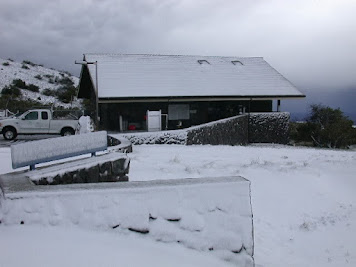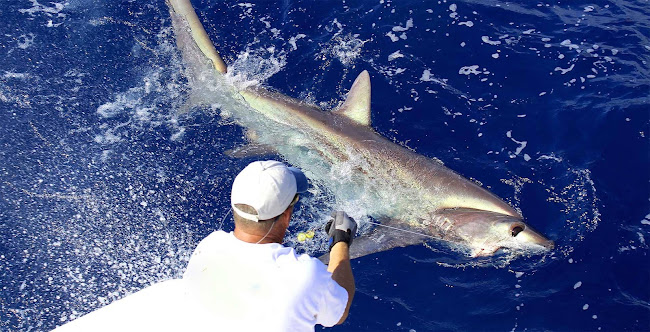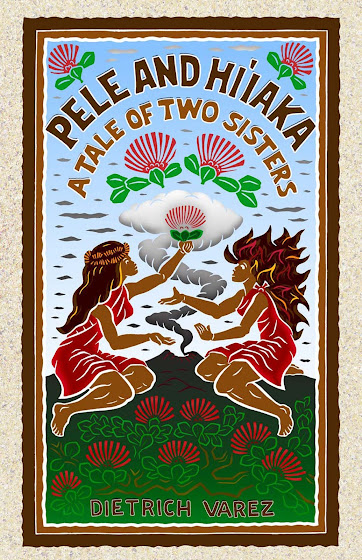the Hawai'i Legislature during its last session. It protects the approximately 40 species of sharks living in Hawaiian waters. See them at https://dlnr.hawaii.gov/sharks/hawaii-sharks/shark-identification-guide/.
Brian Neilson, Administrator of the state Department of Land & Natural Resources Division of Aquatic Resources, said, “We are well aware of how important sharks are to maintain healthy marine ecosystems.
We also recognize their importance in native Hawaiian cultural practices and beliefs.”
 |
| See Hawaiian shark species at https://dlnr.hawaii.gov/sharks/hawaii-sharks/shark-identification-guide/. |
Neilson pointed out that DLNR still has "work to do before it’s fully implemented.” According to the statute, DLNR may adopt administrative rules to implement the new law, including but not limited to: ensuring that the incidental capture and release of sharks while targeting other species is not a violation; preventing the wanton waste of sharks; and limiting gear, such as gill nets, in areas identified as shark nursery habitats. According to Act 51, the conditions of non-commercial permits for the take of sharks “shall include native Hawaiian cultural protocol, size and species restrictions, and a prohibition on species listed as endangered or threatened.”
 |
| Shark killing fines are $500 for first offense, $2,000 for second and $10,000 for the third. Photo from DLNR |
Violation of the new law will be a misdemeanor, but carries significant penalties: $500 for a first offense; $2,000 for a second offense; $10,000 for a third or subsequent offenses; a civil fine not exceeding $10,000 per offense; an administrative fine of no more than $10,000 for each shark captured or entangled, whether alive or dead; seizure and forfeiture of any captured sharks or any part or product, commercial marine license, vessel, and fishing equipment; assessment of administrative fees and costs, and attorney’s fees and costs. For information about sharks in Hawaiian waters, visit the DLNR shark website at hawaiisharks.org.
To read comments, add your own, and like this story, see www.facebook.com/kaucalendar/. See latest print edition at kaucalendar.com.
FREE COVID TEST KITS WILL BE AVAILABLE WEDNESDAY, Jan. 5 at Ace Hardware in Na`alehu. The event is led by Ka'u Rural Health Community Association to provide COVID test kits first come, first served to those who register to receive a COVID vaccine at Ka`u Rural Health Clinic, Bay Clinic, CVS Longs in Pahala or West Hawai'i Community Heath Center.
Other sponsors are Ka`u Hospital & Rural Health Clinic, Community First Kuleana Health, Papa Ola Lukahi: Ke Ko'o Ko'o Project, Hui Malama Ola Na Oiwi, state Department of Health and Queen's Ulu Network.
To read comments, add your own, and like this story, see www.facebook.com/kaucalendar/. See latest print edition at kaucalendar.com.
A DEADLY MAUNA KEA TRIP TO THE SNOW led to the death of a nine-year-old girl and injuries to seven people in a 2018 Toyota Tacoma truck on Saturday. Hawai‘i Island police are investigating a single-vehicle traffic collision that occurred on Mauna Kea Access Road around 3:28 p.m.
Police investigators have determined that the driver of the truck traveling west on Mauna Kea Access Road appears to have lost control of the vehicle when the brakes did not respond. The Tacoma then crossed the roadway in a right curve and went off the left shoulder, approximately 100 yards and fell into a ravine after rolling over, with some of the passengers ejected from the vehicle. At the time of the collision the roadway was wet and it was raining. The location was about 8,000 ft in altitude just below the visitor center.
Five occupants were inside the truck at the time of the collision and three were in the bed of the pickup. All the vehicle’s occupants sustained injuries from the collision and were transported to Hilo Medical Center for treatment and further evaluation.
The operator of the pick-up truck, a 40-year-old female, and a 33-year-old male occupant, were airlifted to Queens Medical Center on O'ahu. A three-year-old boy was airlifted to Kapiolani Medical Center on O'ahu in critical condition. The nine-year-old female, in the back seat of the cab, was transported to Hilo Medical Center and pronounced dead at 5:03 p.m. An autopsy has been ordered to determine the exact cause of death.
Police believe that speed, brake failure, and not wearing seatbelts appear to be major factors in the outcome of this collision. Further investigation will be conducted relative to any additional contributing factors, reported Hawai'i Police Department.
This is the first fatal traffic collision of 2022 compared to zero fatal traffic collisions during this same time period last year.
The East Hawaii Traffic Enforcement Unit has initiated a negligent homicide investigation, which is pending. Police are asking for anyone who may have witnessed the collision or who has information to contact Officer Jared Cabatu at (808) 961-2339 or via email Jared.Cabatu@HawaiiCounty.gov. Tipsters who prefer to remain anonymous may call Crime Stoppers at (808) 961-8300.
Police investigators have determined that the driver of the truck traveling west on Mauna Kea Access Road appears to have lost control of the vehicle when the brakes did not respond. The Tacoma then crossed the roadway in a right curve and went off the left shoulder, approximately 100 yards and fell into a ravine after rolling over, with some of the passengers ejected from the vehicle. At the time of the collision the roadway was wet and it was raining. The location was about 8,000 ft in altitude just below the visitor center.
 |
| The fatal accident happened just below Mauna Kea Visitor Information Center. U.H. Photo |
The operator of the pick-up truck, a 40-year-old female, and a 33-year-old male occupant, were airlifted to Queens Medical Center on O'ahu. A three-year-old boy was airlifted to Kapiolani Medical Center on O'ahu in critical condition. The nine-year-old female, in the back seat of the cab, was transported to Hilo Medical Center and pronounced dead at 5:03 p.m. An autopsy has been ordered to determine the exact cause of death.
Police believe that speed, brake failure, and not wearing seatbelts appear to be major factors in the outcome of this collision. Further investigation will be conducted relative to any additional contributing factors, reported Hawai'i Police Department.
This is the first fatal traffic collision of 2022 compared to zero fatal traffic collisions during this same time period last year.
The East Hawaii Traffic Enforcement Unit has initiated a negligent homicide investigation, which is pending. Police are asking for anyone who may have witnessed the collision or who has information to contact Officer Jared Cabatu at (808) 961-2339 or via email Jared.Cabatu@HawaiiCounty.gov. Tipsters who prefer to remain anonymous may call Crime Stoppers at (808) 961-8300.
To read comments, add your own, and like this story, see www.facebook.com/kaucalendar/. See latest print edition at kaucalendar.com.
JANUARY PROGRAMS FOR KAHUKU section of Hawai'i Volcanoes National Park have been announced. Ranger Orientation Talks are Thursdays and Fridays at 10 a.m. at the Visitor Contact Station. The following Ranger Guided Hikes are scheduled for Saturdays and Sundays. Meet at the Visitor Contact Station.
The Kaʻū Field System: Farming the Rock: On Saturday, Jan. 8 at 9:30 a.m., walk along an old ranch road to the remnants of the field system at Kahuku. Learn how pre-western-contact Hawaiians intensively farmed this area and fed the large population of Kahuku.. This is an easy 1/2 mile, one hour hike to kipuka kāʻopapa and back.
Palm Trail: On Sunday, Jan. 9, at 9:30 a.m., hike a 2.6 mile loop along an old ranch road that leads to amazing volcanic features from the 1868 eruption. Discover relics of the ranching era and learn about hulihia (catastrophic change) and kūlia (restoration). Enjoy panoramic views of Kahuku and the Kaʻū coast. This is a 1.5 hour program
Realms and Divisions of Kahuku: On Jan. 16 at 9:30 a.m, discover the classification system, the realms, and the vertical and horizontal land divisions, that have been used in Hawaiʻi for centuries. Hawaiians made scientific observations of natural phenomena based on their astute powers of observation. This is a moderately difficult two-mile, 1.5-hour guided hike on Kamakapaʻa Trail.
‘Ōhi‘a Lehua: On Saturday, Jan. 22 at 9:30 a.m., learn about the vital role of ‘ōhi‘a lehua in native Hawaiian forests, the many forms of the ‘ōhi‘a tree, and the threat of a new fungal disease, Rapid ‘Ōhi‘a Death. Visitors will be able to identify the many differences of the most prominent native tree in Kahuku on this program, which is an easy, one-mile one-hour (or less), walk.
Hi‘iaka & Pele. On Sunday, Jan. 23 at 9:30 a.m., discover two fascinating Hawaiian goddesses, sisters Pele-honua-mea (Pele) and Hi‘iaka-i-ka-poli-o-pele, and the natural phenomena they represent. Visitors will experience the sisters coming alive through the epic stories depicted in the natural landscape of Kahuku on this moderate two-mile, 1.5 hour hike. Walk across the 1868 lava flow along an old ranch road, and down the old ranch airstrip.
People and Land of Kahuku: On Saturday, Jan 29 t 9:30 a.m., take a moderate two-mile, three-hour guided hike that loops through varied landscapes to explore the human history of Kahuku. Emerging native forests, pastures, lava fields, and other sites hold clues about ways people lived and worked on the vast Kahuku lands – from the earliest Hawaiians, through generations of ranching families, to the current staff and volunteers of Hawai‘i Volcanoes National Park. Learn about the powerful natural forces at work in Kahuku and how people have adapted to, shaped, and restored this land.
The Kaʻū Field System: Farming the Rock: On Saturday, Jan. 8 at 9:30 a.m., walk along an old ranch road to the remnants of the field system at Kahuku. Learn how pre-western-contact Hawaiians intensively farmed this area and fed the large population of Kahuku.. This is an easy 1/2 mile, one hour hike to kipuka kāʻopapa and back.
Palm Trail: On Sunday, Jan. 9, at 9:30 a.m., hike a 2.6 mile loop along an old ranch road that leads to amazing volcanic features from the 1868 eruption. Discover relics of the ranching era and learn about hulihia (catastrophic change) and kūlia (restoration). Enjoy panoramic views of Kahuku and the Kaʻū coast. This is a 1.5 hour program
Realms and Divisions of Kahuku: On Jan. 16 at 9:30 a.m, discover the classification system, the realms, and the vertical and horizontal land divisions, that have been used in Hawaiʻi for centuries. Hawaiians made scientific observations of natural phenomena based on their astute powers of observation. This is a moderately difficult two-mile, 1.5-hour guided hike on Kamakapaʻa Trail.
‘Ōhi‘a Lehua: On Saturday, Jan. 22 at 9:30 a.m., learn about the vital role of ‘ōhi‘a lehua in native Hawaiian forests, the many forms of the ‘ōhi‘a tree, and the threat of a new fungal disease, Rapid ‘Ōhi‘a Death. Visitors will be able to identify the many differences of the most prominent native tree in Kahuku on this program, which is an easy, one-mile one-hour (or less), walk.
Hi‘iaka & Pele. On Sunday, Jan. 23 at 9:30 a.m., discover two fascinating Hawaiian goddesses, sisters Pele-honua-mea (Pele) and Hi‘iaka-i-ka-poli-o-pele, and the natural phenomena they represent. Visitors will experience the sisters coming alive through the epic stories depicted in the natural landscape of Kahuku on this moderate two-mile, 1.5 hour hike. Walk across the 1868 lava flow along an old ranch road, and down the old ranch airstrip.
People and Land of Kahuku: On Saturday, Jan 29 t 9:30 a.m., take a moderate two-mile, three-hour guided hike that loops through varied landscapes to explore the human history of Kahuku. Emerging native forests, pastures, lava fields, and other sites hold clues about ways people lived and worked on the vast Kahuku lands – from the earliest Hawaiians, through generations of ranching families, to the current staff and volunteers of Hawai‘i Volcanoes National Park. Learn about the powerful natural forces at work in Kahuku and how people have adapted to, shaped, and restored this land.
Birth of Kahuku. On Sunday, Jan. 30 at 9:30 a.m., explore the rich geologic history of Kahuku. Traverse the vast 1868 lava flow, see different volcanic formations, including the Southwest Rift Zone of Mauna Loa. Learn about the Kānāwai o Pele, the natural laws of land building that govern Peleʻs realm.
To read comments, add your own, and like this story, see www.facebook.com/kaucalendar/. See latest print edition at kaucalendar.com.




















